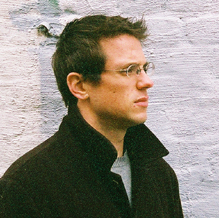 Sunday, January 23, 2005
Sunday, January 23, 2005
sub-zero
Today I returned from Miami and the warm 70 degree tempertures to the bitter freezing cold of Ann Arbor. It could be worse though--I could be stranded at the Fort Lauderdale airport like so many unfortunate travelers trying to get home to New York, Boston, or anyplace around New England. In addition to leaving behind a more desirable climate, I also left Miami after having put in 125 pre-season miles on the bike and a wonderful week of rehearsing with H.K. Gruber and the New World Symphony. As promised, here's the report from last night's concert.
The show was part of the NWS "Sounds of the Times" new music series. The theme of this program was "A Night in New Vienna" and featured an eclectic mix of four composers all associated with the Second Viennese musical tradition. First up was the U.S. Premiere of Johannes Maria Staud's (b. 1974) A map is not the territory (2001) an intense and uncompromising three-movement work based loosely on Alfred Habdank Korzybski's (1880-1950) premises of "General Sematics," a theory that exists somewhere between linguistics and sociology. Transformation Music (1983) by Kurt Schwertsik (b. 1935), an example of his MOB ART, was next and couldn't have provided a more stark contrast to the Staud. It's a smaller chamber piece with ten compact movemtents and is really quite charming. Violinist Piotr Szewczyk's playing was wonderfully sensitive. Unfortunately I was in the green room during the U.S. Premiere of Friedrich Cerha's Impulses (1992-93) and only happened to catch the final bombastic chord as the orchestra manager opened the door to let those of us waiting in the wings know that we were on next.
I played on H.K. Gruber's Aerial (1999), a concerto written for the Swedish trumpet virtuoso Håkan Hardenberger, who was simply amazing. His range, flexibility, and sensitivity were stunning. The piece opens with the soloist playing and singing at the same time--a perfect fifth in this case, which then sounds the resultant major third above. There's something very intimate and introspective about this technique. You become one with the instrument--the voice and the machine. It creates such a wonderful atmosphere, which I had never experienced while performing this technique myself. Hearing Håkan do it made me reconsider the technique and the effect it can have, something I'll take to heart as I continue digging into Martin Bresnick's Tent of Miracles (1984) for baritone saxophone and 3 pre-recorded saxophones.
There was a decent crowd in the modestly sized Lincoln Theater--an audience that was definitely up for the evening's challenge. As far as I could tell not one person abandoned after the first half.
Ironically, on the way home from the Detroit airport today, there was a report by Ari Shapiro on NPR's Weekend Edition about the New World Symphony. The report focuses on the training, both musical and extra-musical, that NWS fellows receive during their tenure, emphasizing the importance of the entrepreneurial, outreach, and music business skills that they are encouraged to develop. I think this is a great thing. And an area often neglected by teachers and music schools in the United States. There are two sides to music-making, the artistic side and the business side. But that's a topic for another day.
posted by Brian Sacawa
1:14 PM
|
|
 Praised by The New York Times as "an inventive musician . . . fresh and surprising," saxophonist Brian Sacawa has firmly established himself as an important contemporary voice for his instrument. He is active as a soloist, recitalist, and chamber musician throughout the United States and is the co-founder of the new music duo Non-Zero with percussionist Timothy Feeney.
Praised by The New York Times as "an inventive musician . . . fresh and surprising," saxophonist Brian Sacawa has firmly established himself as an important contemporary voice for his instrument. He is active as a soloist, recitalist, and chamber musician throughout the United States and is the co-founder of the new music duo Non-Zero with percussionist Timothy Feeney.
He has given premieres of over thirty works by both established and emerging composers, including Michael Gordon, Bright Sheng, Andrew Mead, Oliver Schneller, Ken Ueno, Beata Moon, Hillary Zipper, and Scott McAllister, among many others. Named the Baltimore CITYPAPER’s Critic’s Choice for Classical Music in 2002, he is the recipient of awards for solo performance from both national and international competitions.
Sacawa's versatile career has led to appearances with the St. Petersburg Philharmonic, the Detroit Symphony Orchestra, the New World Symphony, Harvard Group for New Music, New Music Brandeis, Bargemusic, and at meetings of the ISU Contemporary Music Festival, World Saxophone Congress, North American Saxophone Alliance, and New England Saxophone Symposium.
Brian holds degrees from the University of Michigan, the Peabody Conservatory, and the University of Massachusetts – Amherst, where he studied with Donald Sinta, Gary Louie, and Lynn Klock. He has recorded for the Equililbrium, Naxos, and BiBimBop recording labels.
See Brian's other blog
Sounds Like Now
| |



